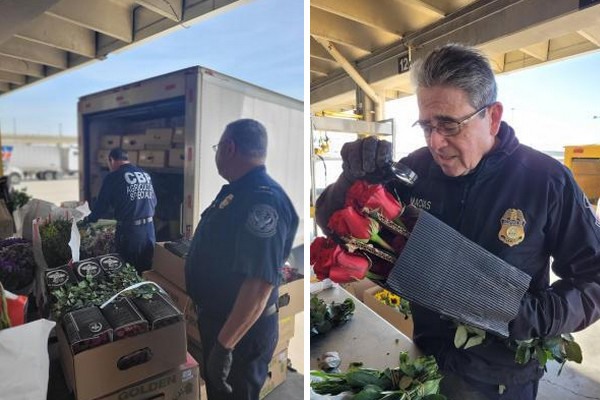U.S. Customs and Border Protection agriculture specialists working at El Paso area ports of entry will be busy in the days ahead tapping and shaking cut flower shipments to make sure that personal and commercial importations of Valentine's Day flowers are free from insects, pests, and diseases that could harm the agricultural and floral industries of the United States. Valentine's Day is Wednesday, Feb. 14.
"Historically, the period leading up to Valentine's Day is among the busiest for CBP agriculture specialists. The volume of floral imports arriving at area ports of entry, including those being transported by individuals, is always high," said Hector Mancha, CBP Director of Field Operations in El Paso. "Vigilant CBP agriculture specialists are hard at work making certain that any imported floral arrangements are free from insects, pests, or disease, ensuring our nation's economic prosperity."

CBP suggests those who plan to import flowers and plants from Mexico to advise their florist that the arrangements are destined for U.S. delivery. Some flowers and plant materials commonly found in floral arrangements at southwest border ports of entry are prohibited. Those include chrysanthemums and choisya ternata (a floral filler) due to pest risk. CBP strongly encourages the public to consult the CBP website before they import floral arrangements so they know which flowers are permissible and which are prohibited or restricted.
Valentine's Day, Mother's Day, and the Easter holiday weekend are the busiest times of the year for CBP agriculture specialists. CBP agriculture specialists are the last line in the fight against the introduction of insects, pests, and diseases into the United States.
While a relatively small number of harmful pests are found among the millions of stems inspected by CBP, a single dangerous pest could cause millions of dollars of damage to our nation's crops. CBP recommends that people who wish to import flowers, plant materials, and other agricultural items consult the CBP Info Center section on the CBP website before they travel or call (877) 227-5511.
Travelers should also declare all items acquired abroad to CBP officers to avoid civil or criminal penalties and reduce the risk of introducing pest and disease to the United States. CBP now offers the CBP One mobile app, which allows travelers to request a variety of CBP services, including inspection of agricultural products. The CBP One app can be downloaded for free from the Apple App Store or Google Play.
Source: cbp.gov
